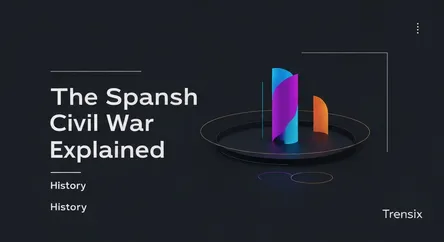History
The Spanish Civil War Explained

A concise overview of the Spanish Civil War (1936-1939), a brutal conflict that served as a prelude to World War II and led to a lengthy dictatorship.
What is it?
The Spanish Civil War was a brutal conflict fought from 1936 to 1939. It began when right-wing military officers, known as the Nationalists and led by General Francisco Franco, launched a coup against the democratically elected, left-leaning Second Spanish Republic. The country fractured into two main factions: the Republicans, who were loyal to the government and comprised socialists, communists, and anarchists, and the Nationalists, an alliance of monarchists, conservatives, and fascists. The Nationalists received significant military aid from Nazi Germany and Fascist Italy, while the Republicans were supported by the Soviet Union and international volunteers. After nearly three years of intense fighting, the Nationalists were victorious, establishing Franco's dictatorship which lasted until his death in 1975.
Why is it trending?
The Spanish Civil War remains a significant historical event because it is widely seen as a precursor to World War II. It was an ideological battleground where democracy, fascism, and communism clashed directly. For Germany and Italy, the war served as a testing ground for new military technologies and tactics, such as aerial bombing, which would be employed on a larger scale in the subsequent global conflict. The war also captured the world's attention, galvanizing public opinion and leading thousands of foreign volunteers to join the fight, most famously in the International Brigades supporting the Republic. Its complex political and social struggles continue to be studied as a key moment in 20th-century history.
How does it affect people?
The war had a devastating and lasting impact on the Spanish people. The conflict resulted in up to 500,000 deaths from combat, systematic killings, and disease. It also created a massive refugee crisis, forcing hundreds of thousands to flee the country, primarily to France. The victory of Franco's Nationalists ushered in nearly four decades of a repressive dictatorship, where political dissent was crushed, and thousands of Republicans were executed or imprisoned. The conflict led to severe economic hardship and social regression, reversing progressive reforms and re-establishing the power of the traditional elite and the Catholic Church. The trauma of the war left deep scars on Spanish society that lingered for generations.